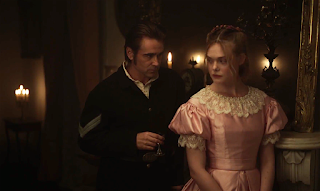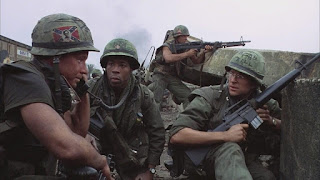Well, we certainly aren’t in 2016 anymore. July only further
signifies how the summer of 2017 is leaps and bounds ahead of those before it,
with an array of interesting movies, a good portion of which were actually
good. See, even the worst movies of this month were not bland in the same way
that the worst of last year had been at this point, they have been uniquely awful
in a way that almost feels refreshing. But getting back to those good movies,
they have not only managed to be consistently good but also terrifically
distinct in both their premise and their execution.
What is most remarkable is that I am giving all of this
praise without even having seen one particular movie that it would be fair to
say some people are mildly excited for (I’ll get around to seeing it soon, don’t
worry). There were a number of excellent blockbusters that I honestly feel bad
for not finding room for them in my top three of this month. ‘Spider-Man:
Homecoming’ was an enjoyable and refreshing take on the superhero genre, while ‘War
for the Planet of the Apes’ was a fantastic finale to one of the strongest
trilogies in recent cinematic history. But alas, they did not crack the very
best of the month.
3: The Big Sick
Having made a big splash at Sundance earlier in the year,
this brilliantly subversive romantic comedy is based on the real life romance
between writer/star Kumail Nanjiani and producer Emily V Gordon, which actually
makes sense given that it’s a story so far out that it could only be based in
reality. The movie never tries to create contrived drama in favour of focussing
on the real human emotions that lie at the centre of the story, focussing on
the quieter and more sobering aspects that ground it in reality. Each character
feels empathetic and relatable but also manages to be immensely watchable as
they navigate this difficult situation, something that the film’s terrific cast
never fail to convey as the film moves on. It’s a movie that is as humorous as
it is heart-wrenching, and is sure to please anyone who gives it a chance.
2: The Beguiled
Nearly two decades after her breakout feature ‘The Virgin
Suicides’, Sofia Coppola brings us a movie that revisits the same themes of
isolation and awakening that have been prevalent throughout her career but
never more than in her first and latest features. With an ensemble that
includes Nicole Kidman, Colin Farrell, Kirsten Dunst and Elle Fanning, the film
displays a slow build of tension in which these volatile characters are thrown
into a nerve wracking situation which Coppola approaches with restraint as well
as a haunting beauty. It comes as little surprise that Coppola won the best
director’s award at the Cannes Film Festival (becoming the second woman to ever
do so) as her command over her craft is impeccable, fully capturing the unease
that underpins the first half of the movie and the frantic dread of the second
as events spiral out of control.
1: It Comes at Night
Not only the best movie of this month but also my new
favourite of the year (sorry ‘Logan’), ‘It Comes at Night’ will undoubtedly
leave some viewers cold, but for those ready to give into its provocative
atmosphere it ends up being a highly rewarding experience. In a script almost
entirely free of exposition, it focusses on the human drama of its story as well
as bringing forth deep seated themes that play on our fears of the unknown. It
paints a claustrophobic, isolated and paranoid portrait that due to a
phenomenal sense of craftsmanship by director Trey Edward Shults, who
deliberately upheaves the films pace and structure as it goes along to chilling
results. It is patient and cathartic but never patronises its audience,
allowing them to truly immerse themselves within the movie’s world and consider
its themes on a more visceral level.
And the worst…
Blind
Of course it’s ‘Blind’, we all know it’s ‘Blind’. It’s a
terrible, bland, melodrama that if anything makes me sad purely because I
wonder how Alec Baldwin got here. So instead of going on about it, I thought I
would take the time to address something else instead.
Movie that is so batshit crazy that I start to wonder what
the fuck is going on once every few seconds, not just for this month or even
year but in general…..
The Book of Henry
I feel like anyone who’s seen this movie is part of an
exclusive club, a club of people who are forever changed because they have paid
witness to Colin Treverrow’s mind boggling oddity that not only failed to
understand the phrase “tonal consistency”, it single handily tracked down
everything and everyone that could provide even the most vague definition of
those two words and destroyed them immediately. With a script that juggles
child geniuses, young friendships, abuse, assassination plots, brain tumours,
grieving parents, authoritarian corruption and so much more, ‘The Book of Henry’
may be terrible, but it also has to be seen to be believed.



























